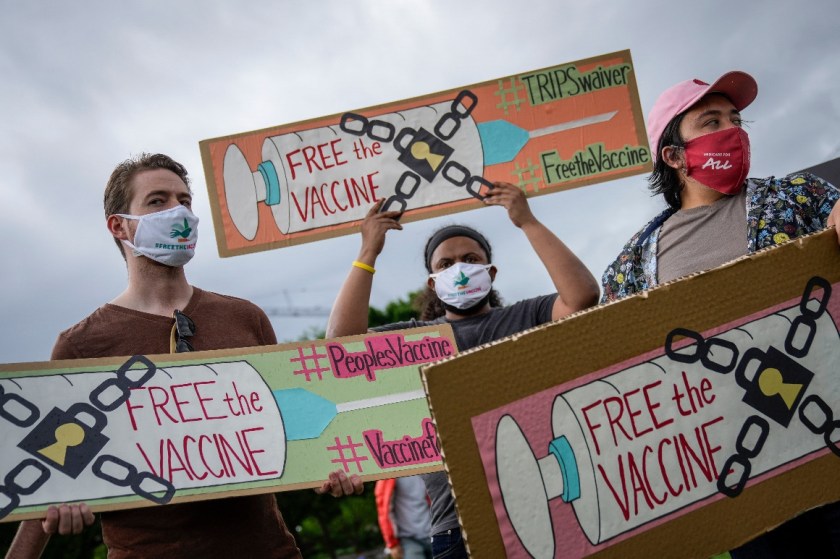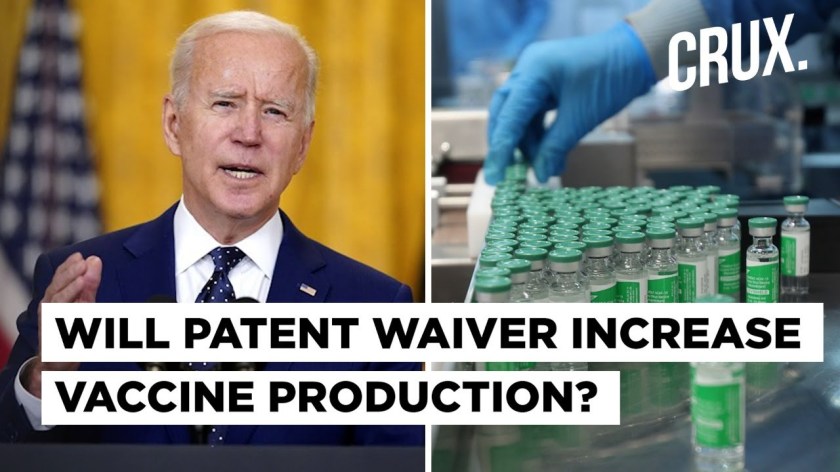When it comes to intellectual property rights, nothing impedes like success.
President Joe Biden last week threw his support behind the World Health Organizations proposal to waive intellectual property rights, including patents and trade secrets, for COVID-19 vaccines, bowing to pressure from Democratic lawmakers and less economically advantaged nations. The move angered not only pharmaceutical companies, but created cause for serious concern among businesses and creators everywhere.
WTO’s intention is to free up rights so that others, primarily local generic providers, can provide more vaccines quicker and cheaper. Waiving the patents and forcing the trade secrets public will do anything but that. It has been likened to a “sugar high” that may feel good initially but will not help the people who need it most.
Many believe the President’s move, under pressure from his party, as a failure to see the forest for the trees — less about speeding Covid vaccines to those nations that need them most than making IP rights less meaningful in an ideas-driven world that has grown to depend on them. Opponents argue, the waiver will boost some businesses in favor of those who have done the hard work and will be impossible to implement in a timely manner if at all.
Biden’s move is a sharp reversal of the previous U.S. position. A statement from U.S. trade negotiator, Katherine Tai, who backed negotiations at the World Trade Organization: “This is a global health crisis, and the extraordinary circumstances of the COVID-19 pandemic call for extraordinary measures.”
Many disagree with Biden’s patent-busting strategy, including allies like the EU, especially Germany, Japan, Norway, the UK, Canada, Singapore and dozens of other nations who see the futility of the move as well as the dangerous precedent it sets.
If U.S. support for a patent waiver is a negotiating ploy, it is an irresponsibly dangerous one.
Other Ways
Surely there are more efficient ways to serve the health needs of hard-hit pandemic nations like India, Brazil and South Africa in a timely manner without firing a mortar into the U.S. patent system? IP as a property right was established in the United States Constitution. Real estate ownership enjoys sacred status in every nation, but successful ‘intellectual’ property, despite its value to commerce and society, often is treated with less respect, especially by those who would rather not pay for access.
Land that is required for a highway or important public work can be ‘acquired’ via eminent domain, a forced sale of land that is needed for improvements. Patented inventions that are funded with government research dollars, too, can be subject to mandatory sharing, a move which, for good reason, is rarely made.
“The move to compel the sharing of trade secrets and other know-how raises tricky legal and practical questions,” writes IAM. “It’s not clear how the relevant know-how would be identified and delineated, for example, or how much effort and resources a patentee could be compelled to expend in helping the licensee get up and running. The viability of compulsory licensing for covid-19 vaccines depends on there being good answers to these questions.”

“The waiver is not about patents so much as data and trade secrets. Like patents, those are very important IP rights in a number of industries,” wrote Joff Wild in a LinkedIn post. Wild reminds readers that patents are in fact public documents, and that India, Brazil and any country can overturn them within their nation at any time. His insightful article can be found here.
“Medium- and low-income countries have consistently argued that IP is an impediment to dealing with multiple critical issues, including climate change. So, do not think this stops with pharma. It could affect many other sectors in future. If I were an SEP [standards essential patent] owner I’d be feeling a bit twitchy now – they are ‘essential’ after all!
“My belief is that we need to be very sure that fiddling with IP will lead to better outcomes. The risks of jumping blind into a different kind of future are immense.”
How Much Disclosure?
“The fig leaf is lifting and it’s explicit that what they are after is the trade secret information about manufacturing,” says James Pooley, former WIPO Deputy Director General and a member of the Center for Intellectual Property Understanding.
“Among other issues, no one knows how to define what disclosure might be adequate. There are knock-down fights in litigation between private parties over identification. I can only imagine the fistfights as the Brazilian, Indian and South African generics companies attempt to pull as much know-how as possible out of the branded pharma players, while they have the pandemic to justify it.”
Handing out a recipe for vaccines without sharing the method or the ingredients — the know-how that goes into its manufacture — will lead to quality issues and poor production. Forcing companies to divulge enabling information and trade secrets not only is a potential threat to their survival, it endangers the lives of the people it is intended to save. Compulsory licensing is bad enough, but forced IP waivers set a new and dangerous precedent that will destroy more than it provides.
The UK and the EU have favoured a system of licensing, whereby know-how is shared and there is more oversight. It is already being done on some cases on a voluntary basis. Licensing can be made compulsory, although the pharmaceutical companies could then be eligible for compensation. Some trade specialists have speculated that the U.S. might be hoping that, by backing a patent waiver manufacturers might be more open to sharing expertise voluntarily, or at least, for a reduced price.
Rational Alternatives
It is easy for well-intended activists to demand that patented inventions, private property, be made available to all based on need and ability to pay. But aren’t governments and insurers responsible for taking care of people, not businesses that succeed? Sharing with those who cannot afford to pay is a fantastic idea, but it needs to be done on an economic basis, otherwise we are likely to be throwing the proverbial baby out with the bathwater.
Even Robin Hood in Nottingham Forest would not survive the supreme idiocy of stealing patents from the rich. Forcing the best inventions and the know-how associated with them public because they are too good can and will come back to haunt us.
If complex scientific discoveries were that easy, NIH, Pasteur, Max Planck Institute, Svenska Institutet and other leading government-funded research centers would solve problems on their own, without the help of businesses or private investors. IP is part of a finely tuned system that encourages disclosure and healthy competition. It works in the U.S and other nations because there are reliable incentives and reasonable certainty about protection and enforcement.
“Make no mistake. The fact that the companies could respond and bring these vaccines out so quickly did not happen through a bureaucratic organization,” said Dan Brown, an award-winning inventor and entrepreneur told a group of students at the University of Colorado recently. “It happened through an economic system built on reliable IP rights and the benefits they provide.”
“For the [pharmaceutical] industry, [a patent waiver] would be a terrible, terrible precedent,” said Geoffrey Porges, an analyst for the investment bank SVB Leerink told The New York Times last week “It would be intensively counterproductive, in the extreme, because what it would say to the industry is: ‘Don’t work on anything that we really care about, because if you do, we’re just going to take it away from you.’”
“That a patent waiver can actually result in vaccines flowing sometime in the next year or two is absolute fantasy, even if they got all the know-how tomorrow,” continues Pooley, a trade secret expert. “It is just not workable. These companies spent a decade developing this secret technology, and even if we could adequately define it, and somehow find a way to get them to hand over their property, notwithstanding their shareholders’ risky investment, it would not produce the imagined results.“We all know how hard it is to pull off a voluntary technology transfer between two parties. Are we going to force the pharma companies to send a team of technicians over to India every month, or so, to help them get started? And what about the raw materials? This is all just so unrealistic that it reinforces the suspicion that it is not really about the pandemic, but instead is a longer term play to get access to valuable secret process technology, no matter what the consequences.
“It’s superficial and naive, insisting it’s all about patents, and holding up Operation Warp Speed, a last-stage acceleration of a primarily industry-funded program as a model for drug development generally,” said one observer.
“These people don’t get it. You either have government funding for developing new medicines — which would require the kind of global government financing and even distribution of outputs that the UN has never been able to pull off — or you preserve the current system of relying on private risk capital to do it. Preserving that system requires the incentives offered by the IP system.”
If we tell innovative businesses and creators that if their inventions are interesting, they can keep them, but if they are extraordinary, they can expect to have them taken away at some point, much of the progress in innovation and creation we take for granted will cease or slow to a dubious trickle.
No Accident
“The proposed waiver on Covid vaccine patents represents perhaps the greatest failure of IP awareness in U.S. history,” said Lew Zaretzki of Hamilton IPV. “With the global pandemic the patent system has achieved among its finest hours, delivering an array of highly effective vaccines in record time and saving millions of lives and billions of dollars.
“President Biden’s support of a waiver shows that U.S. leadership’s disdain for IP rights despite their proven success. It regards the vaccine patents as an impediment rather than a resource in the war against Covid. This is a gross misjudgement. The need to raise IP awareness among diverse audiences has never been greater.”
Image source: politico.com; cruxnow.com

